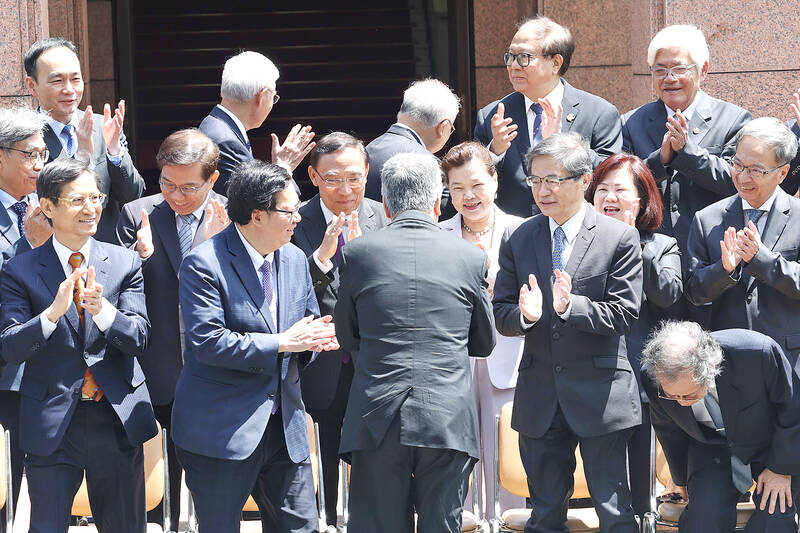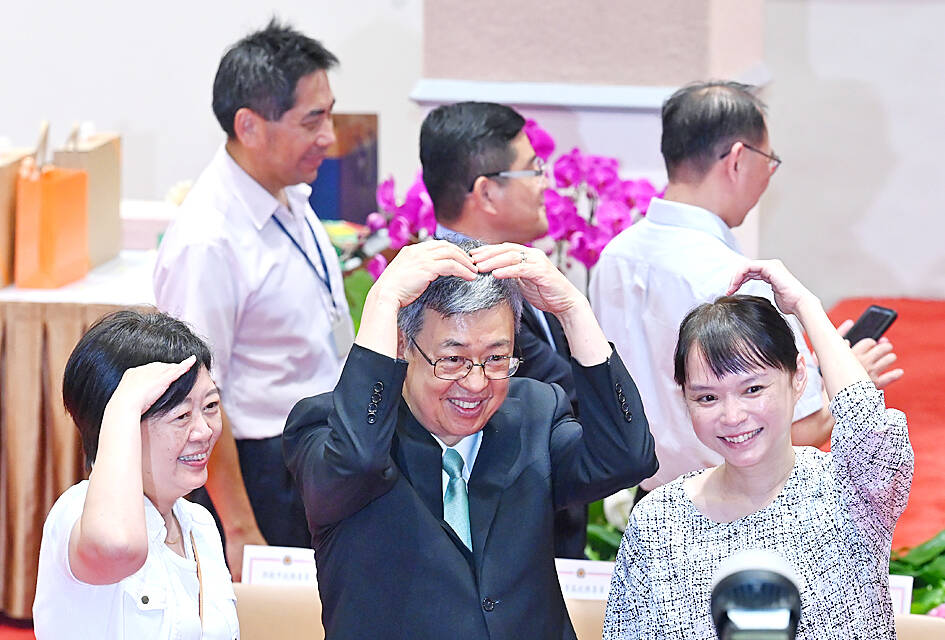Cabinet officials collectively resigned yesterday and are serving as caretakers before the country transitions to a new government, with president-elect William Lai (賴清德) to take office on Monday.
Premier Chen Chien-jen (陳建仁) presided over his last Cabinet meeting yesterday morning, in which the bill for the resignations was approved.
The bill requires the signature of President Tsai Ing-wen (蔡英文).

Photo: CNA
Government officials will continue serving as caretakers until Sunday, only performing routine and essential duties, and not approving any new policies.
Officials reviewed what they had accomplished in the past eight years under Tsai’s leadership, including average GDP growth of 3.15 percent and the transition to renewable energy sources.
Taiwan’s economic growth was better than Hong Kong, Singapore and South Korea — which along with Taiwan are known as the Four Asian Dragons — while renewable energy generation is up 110 percent compared with 2016, a report presented at the Cabinet meeting said.

Photo: Liu Hsin-de, Taipei Times
GDP grew NT$27 trillion (US$840.6 billion) during the period, the report said.
Continuous economic and exports growth was due to the government having clear industrial development strategies and offering incentives to draw foreign investment, it said.
The government in the past eight years increased the budget for childcare to NT$120.1 billion from NT$15.4 billion, while funding for long-term care rose to NT$87.6 billion from NT$4.95 billion, it said.
About 510,000 people have benefited from the increase in funding for long-term care, up from 90,000 in 2016, it said.
The minimum monthly wage has been adjusted in each of the past eight years to reach NT$27,470, up from NT$20,008, while the minimum hourly wage has been raised to NT$183 from NT$120, it said.
Salaries for government workers, teachers and military personnel are up 11.4 percent after three increases, the report said, adding that reform of the pension system for government workers, teachers and military personnel helped ensure the system’s sustainability.
The government’s pledge to make 200,000 social housing units available is to be achieved by the end of this year, while a NT$30 billion program was rolled out to subsidize rent and home loans to economically disadvantaged individuals and families, it said.
“Despite serious challenges brought by a rivalry between the US and China, water shortages, the COVID-19 pandemic, the Russian invasion of Ukraine, climate change, global inflation and energy price hikes, government officials and the public have worked together to build a warm and resilient country, and let the world see Taiwan,” Chen said.
Meanwhile, lawmakers agreed to invite premier-designate Cho Jung-tai (卓榮泰) to brief them on May 31 about the new Cabinet’s vision for governance, following negotiations between Democratic Progressive Party (DPP), Chinese Nationalist Party (KMT) and Taiwan People’s Party (TPP) lawmakers.
The legislative session is to be extended to July 16, they said.
The Act Governing the Legislative Yuan’s Power (立法院職權行使法) stipulates that the new premier should brief lawmakers within two weeks after taking office, adding that a written version of the briefing must be received by lawmakers three days in advance.
The KMT yesterday reiterated its determination to pass bills it proposed today in a plenary session by working with TPP legislators.
The bills would make “contempt of the legislature” a punishable offense and require the president to deliver a “state of the nation” address.
Some KMT and TPP lawmakers lined up outside the legislative hall on Wednesday to prevent DPP lawmakers from delaying the vote by inundating the sessions with motions.
DPP caucus secretary-general Rosalia Wu (吳思瑤) said that the actions were a spectacle and the agenda of the plenary session had been set by the Procedure Committee.
“All 51 DPP lawmakers are ready to do whatever we can and will not give up easily,” Wu said.

AT RISK: The council reiterated that people should seriously consider the necessity of visiting China, after Beijing passed 22 guidelines to punish ‘die-hard’ separatists The Mainland Affairs Council (MAC) has since Jan. 1 last year received 65 petitions regarding Taiwanese who were interrogated or detained in China, MAC Minister Chiu Chui-cheng (邱垂正) said yesterday. Fifty-two either went missing or had their personal freedoms restricted, with some put in criminal detention, while 13 were interrogated and temporarily detained, he said in a radio interview. On June 21 last year, China announced 22 guidelines to punish “die-hard Taiwanese independence separatists,” allowing Chinese courts to try people in absentia. The guidelines are uncivilized and inhumane, allowing Beijing to seize assets and issue the death penalty, with no regard for potential

STILL COMMITTED: The US opposes any forced change to the ‘status quo’ in the Strait, but also does not seek conflict, US Secretary of State Marco Rubio said US President Donald Trump’s administration released US$5.3 billion in previously frozen foreign aid, including US$870 million in security exemptions for programs in Taiwan, a list of exemptions reviewed by Reuters showed. Trump ordered a 90-day pause on foreign aid shortly after taking office on Jan. 20, halting funding for everything from programs that fight starvation and deadly diseases to providing shelters for millions of displaced people across the globe. US Secretary of State Marco Rubio, who has said that all foreign assistance must align with Trump’s “America First” priorities, issued waivers late last month on military aid to Israel and Egypt, the

‘UNITED FRONT’ FRONTS: Barring contact with Huaqiao and Jinan universities is needed to stop China targeting Taiwanese students, the education minister said Taiwan has blacklisted two Chinese universities from conducting academic exchange programs in the nation after reports that the institutes are arms of Beijing’s United Front Work Department, Minister of Education Cheng Ying-yao (鄭英耀) said in an exclusive interview with the Chinese-language Liberty Times (the Taipei Times’ sister paper) published yesterday. China’s Huaqiao University in Xiamen and Quanzhou, as well as Jinan University in Guangzhou, which have 600 and 1,500 Taiwanese on their rolls respectively, are under direct control of the Chinese government’s political warfare branch, Cheng said, citing reports by national security officials. A comprehensive ban on Taiwanese institutions collaborating or

France’s nuclear-powered aircraft carrier and accompanying warships were in the Philippines yesterday after holding combat drills with Philippine forces in the disputed South China Sea in a show of firepower that would likely antagonize China. The Charles de Gaulle on Friday docked at Subic Bay, a former US naval base northwest of Manila, for a break after more than two months of deployment in the Indo-Pacific region. The French carrier engaged with security allies for contingency readiness and to promote regional security, including with Philippine forces, navy ships and fighter jets. They held anti-submarine warfare drills and aerial combat training on Friday in